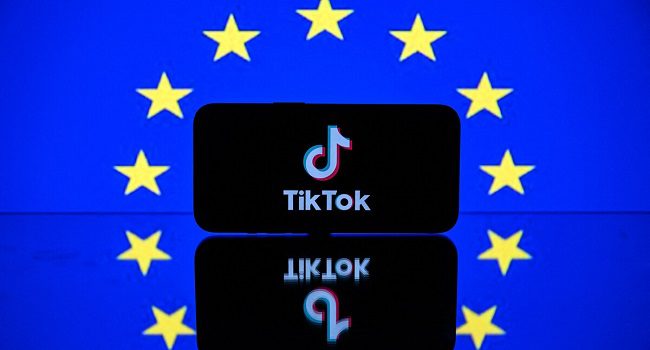EU formally investigating TikTok for compliance with bloc Digital Services Act, As it looks into the alleged breaches, it will now increase the amount of information requests it makes to the platform and may perform inspections and interviews.
The Commission has declared that the European Union is formally looking into TikTok’s adherence to the bloc’s Digital Services Act (DSA).
According to a news statement, the Commission is concentrating its inquiry into TikTok on issues related to risk management of hazardous material and addictive design, data access for academics, and protection of children.
Since Saturday, the DSA, the bloc’s online governance and content moderation guidebook, has been widely implemented across thousands of sites and services. But since last summer, bigger platforms—including TikTok—have been subject to additional regulations in areas like algorithmic transparency and systemic risk, and the video-sharing site is currently being looked into in accordance with these guidelines.
The Commission, which upholds the DSA regulations for larger platforms, particularly those pertaining to child safety and disinformation concerns, has been gathering information for some months before taking the current action.
Related: India may block Proton Mail according to reports
Even said, the EU’s worries about TikTok’s safety and content management policies precede the DSA’s implementation on bigger platforms. Prior to this, in June 2022, the platform had to undergo some operational changes as a result of a coalition of regional consumer protection agencies looking into concerns about privacy and safety.
As it looks into the alleged breaches, it will now increase the amount of information requests it makes to the platform and may even do inspections and interviews. The Commission has not set a formal timeframe for wrapping up this extensive investigation.
For comment on the formal investigation by the EU, TikTok was approached. An email from a corporate representative reads as follows:
TikTok has pioneered features and settings to protect teens and keep under 13s off the platform, issues the whole industry is grappling with. We’ll continue to work with experts and industry to keep young people on TikTok safe, and look forward to now having the opportunity to explain this work in detail to the Commission.
In its press release, the Commission says the probe of TikTok’s compliance with DSA obligations in the area of systemic risks will look at “actual or foreseeable negative effects” stemming from the design of its system, including algorithms. The EU is worried TikTok’s UX may “stimulate behavioral addictions and/or create so-called ‘rabbit hole effects’”, as its PR puts it.
“Such assessment is required to counter potential risks for the exercise of the fundamental right to the person’s physical and mental well-being, the respect of the rights of the child as well as its impact on radicalization processes,” it further writes.
The Commission is also concerned that mitigation measures TikTok has put in place to protect kids from accessing inappropriate content — namely age verification tools — “may not be reasonable, proportionate and effective”.
It will therefore also look at whether TikTok is complying with “DSA obligations to put in place appropriate and proportionate measures to ensure a high level of privacy, safety, and security for minors, particularly with regard to default privacy settings for minors as part of the design and functioning of their recommender systems”.
Elsewhere, the bloc’s probe will look at whether TikTok is fulfilling the DSA requirement to provide “a searchable and reliable repository” for ads that run on its platform.
Also on transparency, the Commission says its investigation concerns “suspected shortcomings” by TikTok when it comes to providing researchers with access to publicly accessible data on its platform so they can study systemic risk in the EU — with such data access being mandated by Article 40 of the DSA.
Commenting in a statement, Margrethe Vestager, EVP for digital, said:
The safety and well-being of online users in Europe is crucial. TikTok needs to take a close look at the services they offer and carefully consider the risks that they pose to their users – young as well as old. The Commission will now carry out an in-depth investigation without prejudice to the outcome.
In another supporting statement internal market commissioner, Thierry Breton emphasized that: “The protection of minors is a top enforcement priority for the DSA.”
“As a platform that reaches millions of children and teenagers, TikTok must fully comply with the DSA and has a particular role to play in the protection of minors online,” he added. “We are launching this formal infringement proceeding today to ensure that proportionate action is taken to protect the physical and emotional well-being of young Europeans. We must spare no effort to protect our children.”
It’s the second such proceeding under the DSA, after the bloc opened a probe on Elon Musk-owned X (formerly Twitter) in December, also citing a string of concerns.
Penalties for confirmed breaches of the DSA can reach up to 6% of global annual turnover. Once an investigation has been opened EU enforcers can also access a broader toolbox, such as being able to take interim measures prior to a formal proceeding being wrapped up.
The EU may also accept commitments offered by a platform under investigation if they are aimed at fixing the issues identified.
The algorithmic transparency and systemic risk regulations of the DSA apply to over twenty platforms. Platforms having over 45 million monthly active regional users are classified as these. In the instance of TikTok, the platform notified the EU last year that it had 135.9 million active monthly users within its borders.
















